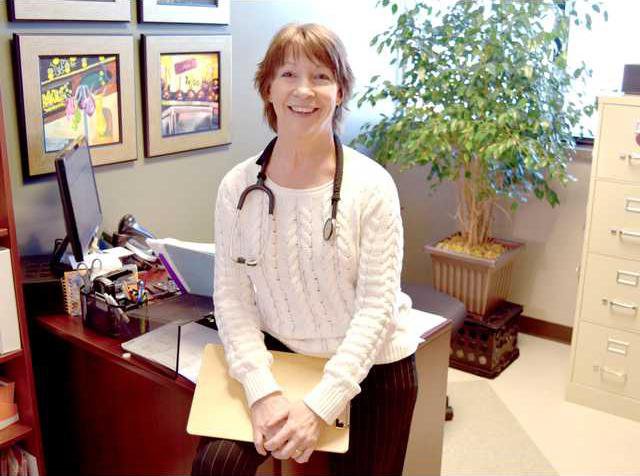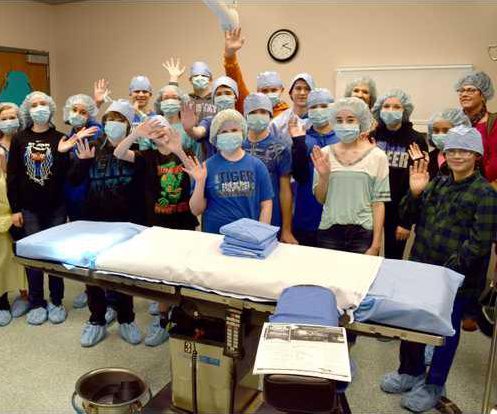SPOTLIGHT ON JULIE KANADY
Name & Title
Julie Kanady APRN, Women’s Health Care Nurse Practitioner
What city do you live in? How long have you been there?
I’ve lived outside Hutchinson since 1990 and now commute to Great Bend four days a week.
Family Members
Husband: Jim
Daughter: Julia
I am one of 9 children.
Hobbies
Reading, sewing, gardening, horses, cats.
What first drew you to this type of work?
I was inspired by my mother.
What do you enjoy most about what you do?
The exchange between myself and the patients. Enriching their health enriches every aspect their lives.
How is it changed since you first began?
Technology, of course, has changed tremendously. Electronic medical records (EMR) brings its special challenges and benefits.
Last month, the Heartland Regional Health Clinic launched a new weight loss program to the public after a two-month trial with employees and their family members. The participants in the test run saw phenomenal results over eight weeks, so the program was made available to the public on Jan. 1. Since that time, several dozen patients have started their weight loss journey, with the goal of improving their overall health.
“New Direction is a comprehensive, medically monitored weight loss and weight management system developed by doctors and medical researchers with the Robard Corporation,” said Julie Kanady APRN, the provider who monitors New Direction patients. “Our system helps reverse the effects of an unhealthy weight, equips the human body to burn fat naturally and safely, and helps you achieve and maintain a healthy life.”
This program is designed to help men and women with a body mass index (BMI) of 30 or more. Women need to be at least 30 pounds overweight to qualify, and men need to be at least 40 pounds overweight.
Shelley Fox was one of the patients who participated in the trial period. “Since starting the New Direction program, I am amazed at how good I feel and how much energy I have. It is nice that my meals are quick and easy to prepare. And as long as I eat the provided meals, the weight comes off very easily and quickly,” Fox said. “I can’t tell you it is easy all the time, but I have seen the difference it has made for me. In a little more than two months, I have decreased by 2 pant sizes and dropped nearly 40 pounds. It is nice to see the scales headed in a ‘New Direction!’”
While weight loss and weight management are usually the primary reasons people would begin the program, there are other benefits. Effects of the program include lower blood pressure, reduced cholesterol, improved energy and overall health, boosted self-confidence, reduced joint paint, and some people can even reduce or eliminate the need for certain medications.
“Obesity is a chronic disease. Like other diseases, obesity requires comprehensive treatment, including a compassionate support system and personalized education to make lasting lifestyle changes,” Kanady said. “Our medically supervised program treats the Obesity Disease with evidence-based medicine, including a comprehensive multi-component plan monitoring your progress through monthly check-ups and periodic lab testing. This lets you see real results and be encouraged to reach your health goals.”
The program has four phases. The first phase is called Screening, and is centered around a comprehensive preliminary medical evaluation to determine if the program is appropriate for the patient. This process includes a physical examination and health history, blood work, EKG, behavioral assessment, and diet readiness questionnaire.
The second phase is called Reducing because this is where participants see the greatest weight loss. Depending on the patient’s weight loss goals, Kanady will help him or her establish a plan through either a Very Low Calorie Diet (VLCD) or a Low Calorie Diet (LCD).
“In this phase, the primary goal is reversing the body’s tendency to store fat and training the body to burn fat instead,” Kanady said. “We provide nutritionally complete meals with 100 percent of your daily recommended intake for vitamins, minerals, protein and fiber.”
During this phase, patients are required to attend weekly support meetings, as well as medical visits and lab evaluations every four weeks. Average weight loss with the VLDC program is about 3-5 pounds per week. Average weight loss with the LCD program is 2-3 pounds per week.
Once participants are within 10 pounds of their weight loss goals, they enter the phase called Adapting. Kanady and health coach Shara Stettinger help them integrate groceries back into their diet, one meal at a time. “This phase is critical to long-term success, because this is where new healthy habits are formed to avoid future weight gain,” Stettinger said. “Participants continue weekly support/educational meetings and see our provider once every four weeks.”
Weekly sessions provide support and tools for making healthy choices, developing strategies for eating out, learning to modify recipes, developing new long-term eating habits, improving the relationship with food, learning exercise techniques, and dealing with stress and other eating triggers.
The fourth and final phase is called Sustaining, and is a permanent stage once participants have met their health goals. “This is the most important phase where participants start using the tools and habits learned in the Reducing and Adapting phases,” Stettinger said. “I am still available on a regular basis, and participants are encouraged to attend the weekly classes per their needs, as research shows this can be key to long-term success.”
Anyone interested in learning more can attend one of the Heartland Regional Health Clinic’s free, no-obligation orientation sessions. These meetings are held on the first and third Mondays of each month, and last between 30 and 45 minutes with opportunities to ask questions and try samples of the products.
For more information or to register for an orientation meeting, visit www.gbregional.com/newdirection or contact Program Director Shara Stettinger at 620-791-6899.
“The most important and interesting component of this new program is that patients are medically monitored and guided through the weight loss journey with safe and effective results,” Kanady said. “Obesity is a chronic disease, but anyone can overcome it with the right training and support. It’s up to the person to stand up and fight it.”





